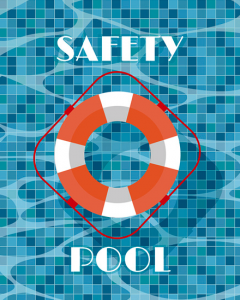 With a mobile phone or tablet in our hands most of the day, we now live in a world of almost endless distractions. While technology is wonderful and helpful, it also makes certain activities a bit more dangerous for children. Whenever a child is in or near water, there is a danger or risk of drowning. Adult supervision is key to the safety of children; however, the presence of an adult in the water area is a bit different than the attention of an adult. If the adult is physically present in the area of the pool or beach, the physical presence may not mean much if the adult is otherwise engaged in the latest text, tweet, or e-mail on the phone or tablet. Because of this, it is important to have as top of mind awareness the safety needs of the children.
With a mobile phone or tablet in our hands most of the day, we now live in a world of almost endless distractions. While technology is wonderful and helpful, it also makes certain activities a bit more dangerous for children. Whenever a child is in or near water, there is a danger or risk of drowning. Adult supervision is key to the safety of children; however, the presence of an adult in the water area is a bit different than the attention of an adult. If the adult is physically present in the area of the pool or beach, the physical presence may not mean much if the adult is otherwise engaged in the latest text, tweet, or e-mail on the phone or tablet. Because of this, it is important to have as top of mind awareness the safety needs of the children.
Nearly 7 out of 10 drownings occur while an adult is present. In a life and death situation, people need to be alert and aware of their surroundings. However, the pool presents a myriad of distractions; if a person is swimming in the pool, they can be surrounded by splashing and other people, which could take their attention away from the child they are supposed to be watching. And, even if the watcher is out of the pool, they could be reading a book or looking at their phone at the precise moment they need to step into action and prevent a drowning. But drownings are almost always preventable; in fact, it is the leading preventable cause of death for children under the age of 5. So what steps must one take in order to prevent a child from drowning?
Among the most important preventions one can take is to have a Designated Watcher whose sole purpose is to keep an eye on the people in the pool. These people are reminded to not look at their phones or other distractions and not leave the pool area unless another person replaces them. While a Watcher is the best preventative measure, there are other choices one can make to improve pool safety. Installing a gate around the pool would keep small children from running into the water and drowning before an adult can intervene. It also helps to have a number of flotation devices, like pool noodles or kickboards, that can be thrown into the pool for a child to grab onto. If these measures are implemented, children will be markedly more safe in the pool this summer.
 Child Injury Lawyer Blog
Child Injury Lawyer Blog


 In West Virginia, day care centers / child care centers are regulated by the West Virginia Department of Health and Human Resources. The definition under West Virginia law as to what constitutes a child care center is quite broad and includes the following:
In West Virginia, day care centers / child care centers are regulated by the West Virginia Department of Health and Human Resources. The definition under West Virginia law as to what constitutes a child care center is quite broad and includes the following: In West Virginia, parents rely on day care center / child care centers to watch over or supervise their children while they are at work. It is vital that day care centers follow the applicable West Virginia laws and regulations. In addition, it is just as important that the day care center and its staff use everyday common sense and good judgment when supervising children. Pursuant to
In West Virginia, parents rely on day care center / child care centers to watch over or supervise their children while they are at work. It is vital that day care centers follow the applicable West Virginia laws and regulations. In addition, it is just as important that the day care center and its staff use everyday common sense and good judgment when supervising children. Pursuant to  Pursuant to Section 17C-11A-4 of the West Virginia Code, all children under the age of 15 years old are required to wear a bicycle helmet In fact, it is unlawful for any parent of a child under the age of 15 in West Virginia to knowingly allow the child to operate or be a passenger on a bicycle without a proper fitting bicycle helmet. See
Pursuant to Section 17C-11A-4 of the West Virginia Code, all children under the age of 15 years old are required to wear a bicycle helmet In fact, it is unlawful for any parent of a child under the age of 15 in West Virginia to knowingly allow the child to operate or be a passenger on a bicycle without a proper fitting bicycle helmet. See  Assistant Principal, Anthony Alvarez, 40, of Arvada High School, located in Arvada, Colorado, faces charges of sexual assault on a child by a person in a position of trust. It was reported that his wife caught Alvarez having an affair with a student and forced him to turn himself in.
Assistant Principal, Anthony Alvarez, 40, of Arvada High School, located in Arvada, Colorado, faces charges of sexual assault on a child by a person in a position of trust. It was reported that his wife caught Alvarez having an affair with a student and forced him to turn himself in. Pursuant to
Pursuant to  Pursuant to
Pursuant to